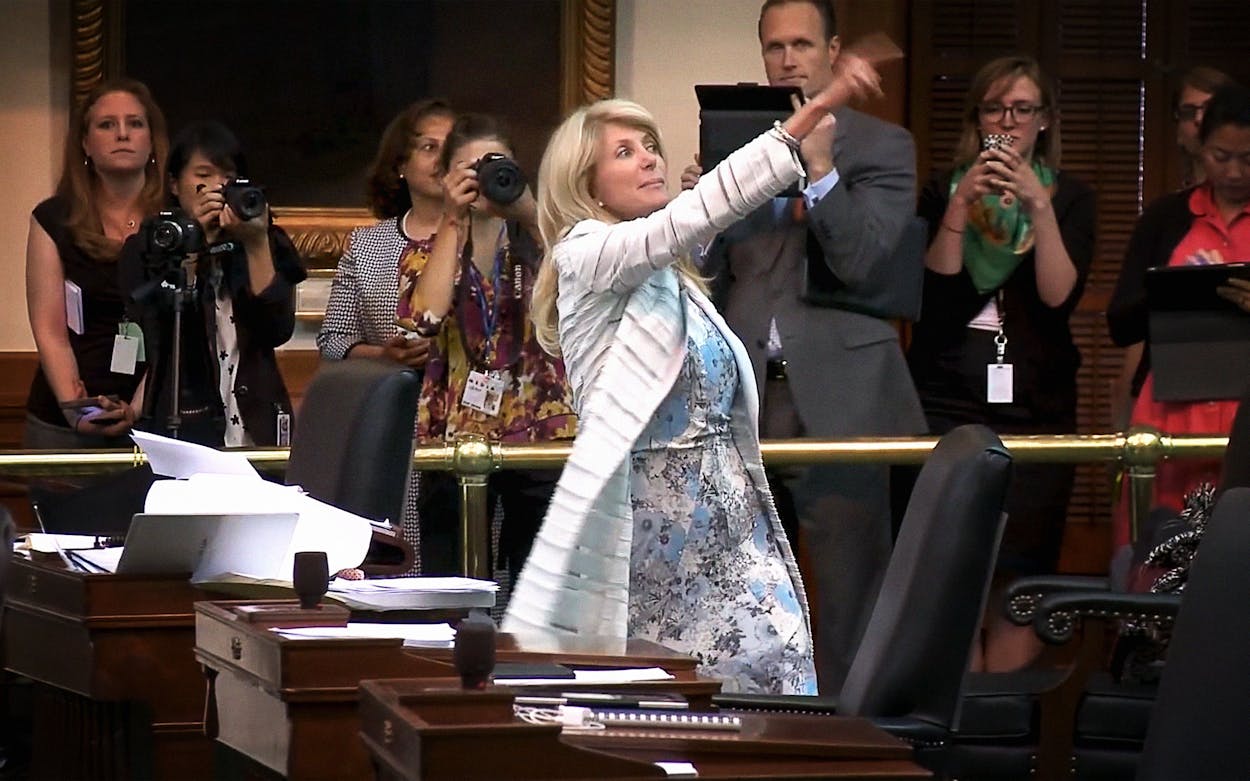The Rollins Theater near downtown Austin was only about half full, but the boldface names inside were big enough for the event to feel important. It was the world premiere of Shouting Down Midnight, a documentary about then–state senator Wendy Davis’s historic 2013 filibuster of a bill that sought to ban abortions in Texas after twenty weeks. Davis, who achieved national fame for her protest and then ran for governor a year later, sat in the second row, next to director Gretchen Stoeltje, and in front of beloved homegrown director Richard Linklater (an executive producer of the documentary). At the front of the theater, former Austin mayor Kirk Watson, who’s running for the office again this year, took in the film. Greg Casar, a former Austin city councilman and current Democratic congressional candidate in the middle of his own meteoric rise, replete with an endorsement from New York congresswoman Alexandria Ocasio-Cortez, also sat nearby. The crowd was a who’s who of local liberals invested in the idea that the Texas Democratic party can affect real change, without much changing its approach.
That is the message Shouting Down Midnight clings to, somewhat awkwardly. The documentary offers a play-by-play recounting of the thirteen-hour filibuster, from both Davis’s perspective and that of the many who descended upon the Capitol to support her. In about fifty minutes of footage from the night, and another fifty minutes of interviews with activists, conducted over the past eight years, it frames the event as an inspiring example of democracy at work. But the film has been in development for nearly a decade, and what started as the hopeful chronicle of a rising blue wave had to pivot after subsequent Democratic electoral disappointments—not least Davis’s failed gubernatorial bid in 2014.
Reality has put a cap on the film’s power to inspire. The abortion bill Davis blocked that night in June 2013 passed just weeks later in a special legislative session. It was eventually struck down by the Supreme Court in 2016, but it was followed by even more restrictive laws limiting abortion access in Texas, including one passed last year that effectively bans the procedure beginning about six weeks after gestation. For decades, Texas Democrats including Davis have promised that a change is gonna come, and yet today the state remains red and the GOP maintains a tight grip on every statewide office and both chambers of the Legislature. In hindsight, Wendy Davis’s filibuster could be seen as just another example of things not working out. So why make a documentary about it?
Since Shouting Down Midnight cannot be a film about the filibuster that changed everything, it opts instead to take a more intimate view. It opens with scenes from an October 2021 rally for reproductive justice on the steps of the Texas Capitol and closes with Davis’s triumphant (if brief) delay of the 2013 abortion bill. In the middle, the film focuses on the lives of three women, Sadie Hernandez, Krithika Shamanna, and Carole Wall, who have devoted themselves to activism since the filibuster.
Hernandez, who was in college in 2013, spent the next several years working as a field organizer for Planned Parenthood. Shamanna, who was just thirteen when she watched a livestream of the filibuster with her mother, now heads the Rice University chapter of Davis’s organization Deeds Not Words, whose mission is to teach women how to affect policy change. Wall, who wrote a letter about her abortion that moved Davis to tears as she read it aloud during the filibuster, has spent the past decade working as a grant writer for multiple reproductive rights organizations, including Planned Parenthood and NARAL Pro-Choice America. Following these three women is a smart move on the part of Stoeltje, and it mitigates the disappointment that accompanies Davis’s post-filibuster losses. Some things did change, you see! At least these women did.
But the triumph feels forced and, at times, pointlessly nostalgic—an exercise in resting on one’s laurels. The film pays no mind to important chapters in the story of Texas’s never-arriving blue wave. It glosses over Davis’s disastrous run for governor against Greg Abbott in 2014, writing off her twenty-point loss as little more than sexism at work. And it ignores the very reasons the six-week abortion ban was able to pass last year: the Democratic party’s consistently weak lineup of statewide candidates; failure to court Latino voters who hold complicated views on abortion, immigration, policing, and other issues; and inability to win enough local races to wield power in the Legislature, to name a few.
Halfway through its running time, the documentary gets the closest it will come to reckoning with the failures of Democrats. Davis, in an interview with Stoeltje, preaches that even a loss can affect change. “Even when you don’t win, you move the needle,” she says. Then the film briskly moves on to more triumphant chest-beating, as if it cares only to answer the question “Wasn’t this great?” and not “Why didn’t this victory stick?” Answering that question, unfortunately, would run the risk of offending the movie’s core South by Southwest audience—other Democratic politicians who might find comfort in low expectations.
- More About:
- Politics & Policy
- Film & TV
- Texas Legislature
- Abortion
- Wendy Davis








